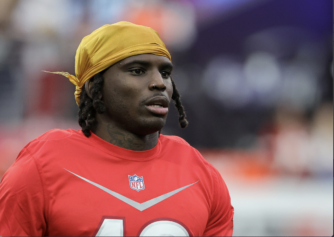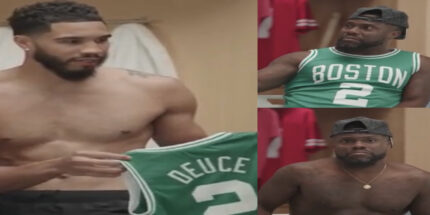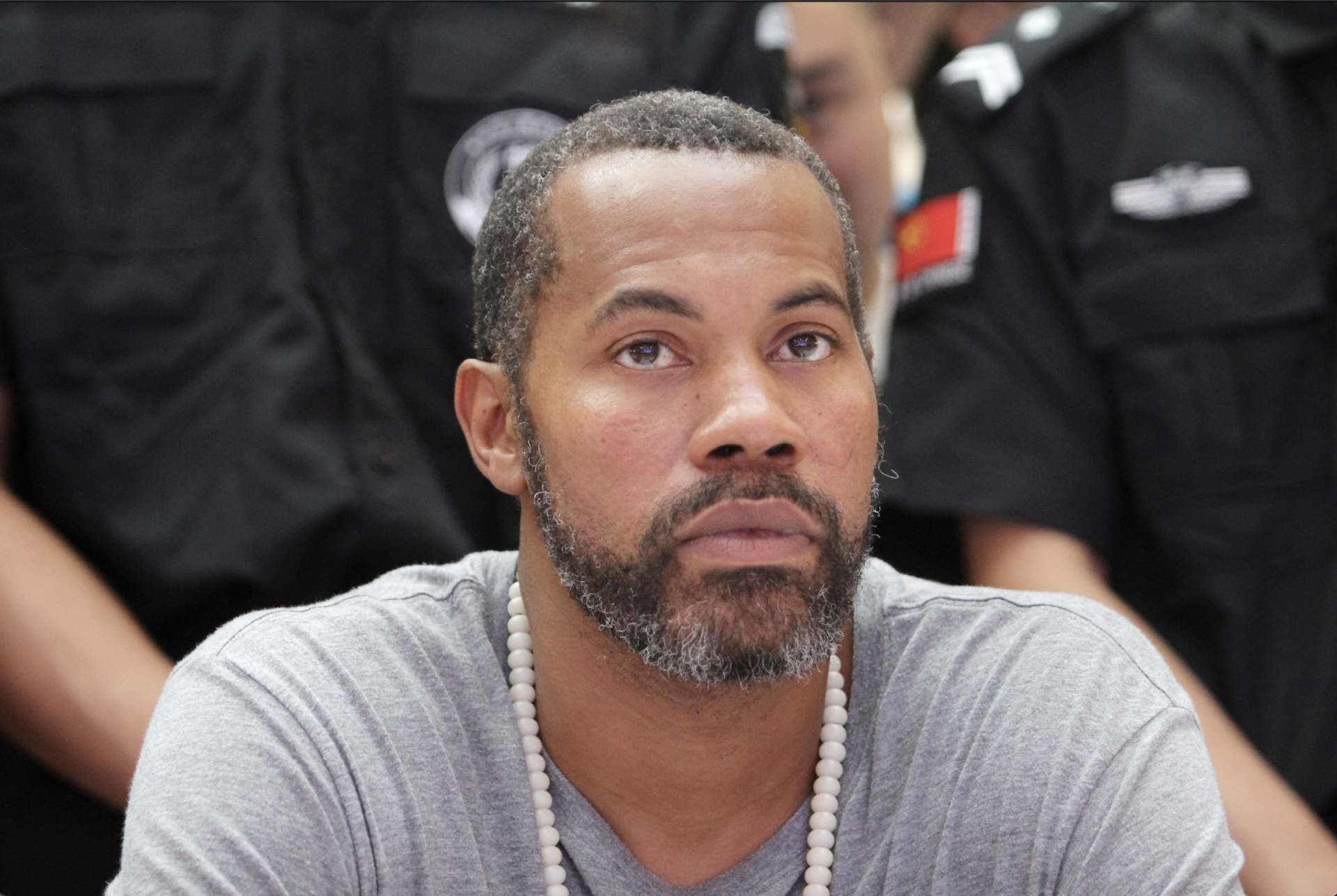Joy Bryant never wanted to be an actress. Although it’s hard to tell when glancing at her lengthy resume. She’s appeared in a movie nearly every year, since booking her first role in Robert Townsend’s Carmen: A Hip Hopera with Beyoncé and Mekhi Phifer back in 2001. Since then, she’s worked with Denzel Washington in Antoine Fisher, Mario Van Peebles in Baadasssss!, Malcolm Lee in Welcome Home Roscoe Jenkins, along with films like Bobby, Get Rich or Die Trying, and The Skeleton Key. The last four years, she’s had a reoccurring main role on NBC’s hit show Parenthood. And now, as she returns to the big screen working with producer Will Packer and cast mates Kevin Hart, Michael Ealy, and Regina Hall in the hilarious romantic comedy About Last Night, Joy Bryant, 37, comes off more like an around the way girl from the Bronx, than the movie star that she is.
In this exclusive interview with The Shadow League, Bryant shares her path from Public Housing to Hollywood, and how she blocked out naysayers that questioned how she did it.
Raqiyah Mays: You’ve come a long way, baby…
Joy Bryant: Oh yeah, BX. From the projects to the penthouse. (laughing)
RM: I’ve watched your come up in the 90s, starting from modeling. Was this the plan? Modeling for Tommy Hilfiger to being a movie star? Some people have that vision.
JB: No. I didn’t have that vision. Because before I started modeling I was at Yale. I dropped out. What I thought my original path in life was to go to Yale, major in economics, get a job on Wall Street or corporate America, make lots of money, take my nana out the ghetto… And while I was at Yale my freshman year, my grandmother, who raised me, died. And so that sent me into this whole spiral of ‘What am I doing here?’
RM: Wow. I’m sorry to hear that. How does a girl from the projects get into Yale?
JB: I worked so hard to get in. I got a scholarship to a boarding school in Connecticut. And I’d done the necessary summer programs that were going to fast track me that I didn’t necessarily like or was passionate about. But it seemed like, 'Well, I’m a girl on welfare from the Bronx, you better get up in here, get that opportunity and do what you do.'
RM: Somebody told you what to major in?
JB: Somebody told me that’s what you need to do. If I followed what I was really passionate about, I’d have been a classics major. I had studied Latin in high school for years, president of the Latin club.
RM: President of the Latin club? Were you a 4.0 GPA type of student?
JB: No, I graduated magna cum laude. I don’t even know what that means.
RM: Yes you do. Smart girl.
JB: Perhaps if I came from a family with more money, I’d have been like, ‘I’m gonna do what I love.’ But I didn’t have that option.
RM: Did they instill that in you? Some people come from families that ingrain the need for education in you.
JB: My grandmother had a 9th grade education. My mother was very smart. She was young when she had me, 15, and took some college courses later on, but was very smart, a good writer. But my grandmother, just because she had a 9th grade education didn’t mean anything. Education for her was the key, answer, and solution to any and everything. So (she smacks her hands) that was ingrained.
RM: They were on welfare. So how did they send you to Yale?
JB: I got into [the program] A Better Chance. And then I got into the Fieldston Enrichment Program. And with programs like that, a lot of private schools will come to scout and sort of weed out and filter in who is the talented minority student that would come to a school like Westminster, which is where I went, and thrived. So that’s how I got those opportunities, got [an academic scholarship] into Yale and went.
RM: And then your grandmother dies…
JB: Now I’m [there] like, ‘Fuck. My grandmother’s dead. I don’t know what is what.’ I realized those choices I made, those weren’t choices based on what I really wanted to do. They were based on a means to an end almost. So I stayed around for another year and got an opportunity to model. That’s not what I planned. But it made sense. And it ended up working out. I never turned back.
RM: So do you have any regrets on not getting that Ivy League diploma?
JB: The only time I regretted leaving was two years later when all my friends were graduating. There weren’t that many people that [were] supportive of my decision to leave.
RM: Yeah, people tend to not understand when you follow your heart or step out from the norm of what we’re “supposed” to do.
JB: You know, it doesn’t make any sense. And it wasn’t till after I left that one of my friends who’d come up with me said that when I left they were like, ‘What is she doing?’ They said, ‘But, you’re doing really well, and I gotta say, I’m kinda jealous. I envy you. Because you were able to make that decision based on what you felt was best for you. Not based on what your parents are telling you to do.’
RM: So how did acting come about?
JB: I was at a commercial agency, innovative, and they sent me out on an audition like, ‘We know this isn’t really what you’re trying to do. But it’s for As the World Turns. A 21 year old black model.’ And I got really far in the audition screen test. But once you do the screen test, you have to do your contract before. I’m not sure if that’s how it still is, but back then, if they want you, there’s no out. So when I heard that, I was like, ‘I’m going to withdraw myself from the consideration.’
RM: What? Why?
JB: One of the casting directors from CBS called me and asked me why, ‘I think you have really natural abilities.’ And I said, ‘I love my life right now. I live here and Paris.’ I was modeling, and had this amazing life. And as I went through the auditions, I saw the people coming in, the actors, and they want this. And I can see it. [I said], ‘I’d feel so disrespectful if I were to take something I didn’t really want when there was someone who really wants it.” That’s why I left Yale. Like, ‘I’m not here to keep this fucking seat warm. I don’t feel passionate about it and I can’t do it.’ And [the casting director] he was like, ‘Please take an acting class. You just have a natural ability.’ I was like, 'Yeah, yeah, yeah…'
RM: But then you actually decided to go to school.
JB: I guess less than a year later, I was in London with a woman and we’d just gone on a casting and she said she was going to an acting class. And I said, ‘Really? Can I just come watch?' And I went, and that was it. I took classes in New York, Not ‘cause I wanted to be an actor. Just because I thought it was very therapeutic. And then I started doing auditions slowly, and that was a year, year and half of me taking classes. And then I got Carmen. And I was like, ‘What? Ok, this is cool.’ And then I did Showtime with Robert DeNiro and Eddie murphy and I died real quick with Mos Def. And I was like, ‘Ok, that’s not so cool. But that’s ok…’ And then I got Antoine Fisher. All within the space of 6 months. That’s why it took me a long time to even be able to call myself an actress, ‘cause I didn’t come in…
RM: How long did it take you?
JB: Last year? What’s today?
RM: (laughing) Well, God laughs at plans. We’ll have this whole plan laid out and…
JB: My friend says, ‘Stick to the plan till the plan changes.’ And that’s been my whole thing.
RM: So now you’re simultaneously on NBC’s Parenthood. And you’re back on the big screen in About Last Night. Where do you see the most opportunities for actors of color? TV? Film? What’s the difference?
JB: Possibly more on TV. But I feel like, if you want to be an actor, it’s about being an actor. And you find the work where it is. There does seem to be more opportunities on TV, but that shouldn’t limit you. I’m always looking for the project that I respond to. I don’t care if it’s on TV or film. I just want good material. I won’t limit myself to the medium. In terms of advice, do your work, do your homework. Know thyself and don’t give up until it’s time to move on. We all know when that time is. Believe in yourself, is the most important, cause there will be times when no one believes in you. The casting director, your family, like no one believes in you. So how are you gonna ride those times? You have to believe in your heart of hearts in what you’re doing and your power and your talent. And that’s the only thing that’s gonna sustain you. Cause there will be plenty rainy days and plenty people [saying], ‘What are you doing?’ If I’d listened to people, I’d have been at Yale, miserable. And I left Yale. I [was] a poor black child from the Bronx and I played it like I was a rich white kid from Connecticut, like ‘I’m just gonna drop out of Yale. I’m just gonna.’ You don’t come from a place of lack and poverty in your spirit. You come from a place of wealth like, ‘That’s how I’ma roll. You can’t tell me I can’t do that, ‘cause I’ma do it. And if you tell me I can’t do that, I’ma do it, just ‘cause you told me I can’t.’
About Last Night hits theaters February 14.



